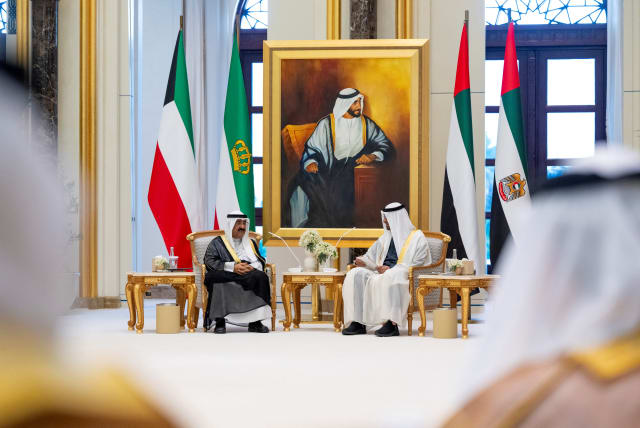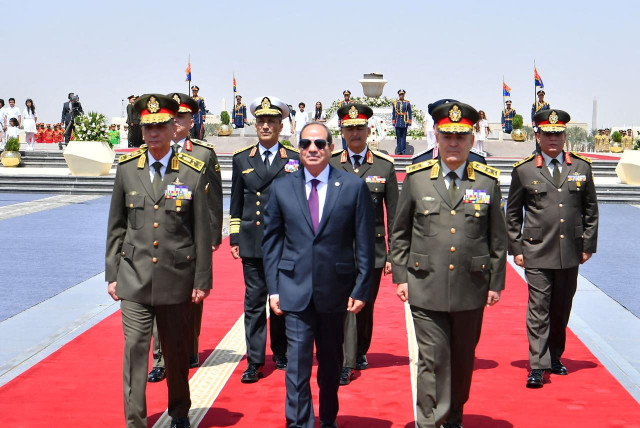UAE, Egypt, Bahrain push for peace in the Middle East

In Cairo, Bahrain and Egypt discussed the desire for calm in Gaza and putting an end to “ongoing regional tension.” The two sides agreed on the urgent need to exert efforts towards de-escalations.
The UAE, Egypt, and Bahrain, which all have relations with Israel, have pushed for peace and a reduction of tensions in the region this week in a series of conversations.
Egyptian President Abdel-Fattah al-Sisi hosted Bahrain’s King Hamad bin Isa Al Khalifa in Cairo and held talks on Wednesday. In addition, Saudi Arabia’s Crown Prince Mohammed bin Salman Al Saud spoke with United Arab Emirates President Sheikh Mohamed bin Zayed Al Nahyan, one of several important conversations the president had this week as part of a UAE push for peace in the region.
Saudi Arabia and the UAE “discussed the repercussions of the military escalation in the region, the threat it may pose to the security and stability of the area, and the need to act to prevent the situation from worsening.” This appears to be a reference to the Iranian drone and missile attack on Israel.
In Cairo, Bahrain and Egypt discussed the desire for calm in Gaza and ending “ongoing regional tension.” The two sides “agreed on the urgent need to exert and encourage immediate and intensive efforts toward de-escalation, both in the Palestinian territories and at the regional level,” the Egyptian president told a joint press conference.
Calling for an immediate ceasefire in Gaza
Sisi urged an immediate ceasefire in Gaza. He also said there should be a flow of humanitarian aid to the Strip, and discussed the need for a two-state solution.
“The Bahraini king said that he agreed with the Egyptian president on the necessity of implementing an immediate ceasefire in Gaza and maintaining humanitarian aid delivery to the enclave, the need for a political path towards a just and lasting peace in the region, as well as the acceptance of Palestine as a full member of the UN,” Xinhua news agency in China noted.
They also discussed the upcoming Arab Summit in Bahrain that will take place in May. “I agreed with the King of Bahrain on the need to stop the escalation in the Palestinian territories and at the regional level,” Al-Ain media reported Sisi as saying. “I discussed with the Egyptian president the need for a political path towards a just and lasting peace in the region based on the two-state solution and acceptance of Palestine’s membership in the United Nations,” the king of Bahrain said.
Hamad also praised Egypt’s historic role in the region, noting that its role in peacemaking goes back to the era of Egyptian pharaoh Ramesses II and the peace treaty with the Hittite empire, known as the Treaty of Kadesh, which was made in 1258 BCE.
At the same time, the UAE has tried to reduce escalation in the region, Al-Ain media noted. This is important because the Emirates and Bahrain are both part of the Abraham Accords. Since October 7, it has appeared that Iran and Qatar have often tried to take the spotlight in the region, and their roles as well as Turkey’s have not reduced escalation. For instance, Hamas leader Ismail Haniyeh is supposed to travel to Ankara this week. Turkey is one of the foremost anti-Israel countries in the region and a key backer of Hamas.
Taking a peaceful role
By contrast, the UAE, Bahrain, Saudi Arabia, and Egypt have played a positive role in peace and stability. The Emirates is now seeking to reduce escalation in the region, Al-Ain says. The report notes that what is kind of a cold war between Israel and Iran could turn “hot” after the Iranian attack on Israel. The UAE leader spoke to a number of Arab leaders this week, the report notes.
“The Middle East region is on the verge of hot war after the Iranian attack on Israel last Saturday, while Tel Aviv is currently studying ways to respond, at a time when the Israeli escalation in the Gaza Strip has continued since the seventh of last October,” it said.
In the call with Riyadh, they discussed the need for self-restraint to spare the region from war. They called for a ceasefire in Gaza and to ensure the flow of humanitarian aid to Gaza. They also discussed the need for a two-state solution. This is a message discipline that dovetails with the Bahrain-Egypt talks. According to the Al-Ain report, the UAE leader also spoke with the king of Bahrain, and the king of Jordan, as well as the emir of Qatar.
“Sheikh Mohammed bin Zayed Al Nahyan discussed with the three leaders the developments taking place in the Middle East region, most notably the developments of the worsening humanitarian crisis in the Gaza Strip and the strengthening of the response to it... in addition to intensifying the efforts made for ceasefire in the Strip, provide full protection for civilians, and ensure the delivery of adequate humanitarian aid. In various possible ways, in a sustainable and unhindered manner,” the report notes. They discussed coordinating Arab state efforts in this regard.
Dr. Anwar bin Mohammed Gargash, the diplomatic adviser to the president of the United Arab Emirates, tweeted about his country’s recent initiative, noting that the phone calls “focus on the need to give priority to wisdom and embrace diplomacy to stop the escalation taking place in the region.”
The UAE reaction to the airstrike in Damascus
The UAE has condemned the airstrike in Damascus in early April that was part of the escalation. Iran blames Israel for the airstrike near its consulate. Tehran then launched 350 drones and missiles at Israel on April 13-14.
“Following the Iranian attack, the UAE expressed grave concern about the developments that the region witnessed during the past days, and called for stopping the escalation and not taking steps to exacerbate tension in the region,” the report notes.
“The UAE has been following the principle of promoting security, peace and sustainable development throughout the region and the world since its founding on December 2, 1971,” it said. The Emirates sees this as wise diplomacy and as part of a wider global effort by Abu Dhabi in this regard.
The article references the Abraham Accords, noting “the peace agreement with Israel did not close the way for the UAE to take strong positions in support of Palestine and Al-Aqsa, whenever circumstances required, but rather provided it with a framework that strengthens its demands in this regard as a matter of peace relations with Israel.”
The report also noted the support the UAE has provided to Gaza. The Emirates plays a key role in humanitarian aid. It also partnered with World Central Kitchen in providing aid from Cyprus. After the killing of seven WCK humanitarians, the aid corridor was paused. It is expected that there will be new progress on this issue in the future.
For instance, the IDF said on April 17 that, “for, the first time since the approval of the opening of the Ashdod Port, humanitarian aid enters the Gaza Strip via the Kerem Shalom crossing. In accordance with the government directive, and coordinated by the IDF and COGAT, eight World Food Program (WFP) trucks of flour entered the Gaza Strip from the Ashdod Port today [Wednesday].”
The use of Ashdod and a new opening of a crossing in north Gaza would appear to meet some of the requests that are being heard from Egypt, the UAE and Bahrain.
Jerusalem Post Store
`; document.getElementById("linkPremium").innerHTML = cont; var divWithLink = document.getElementById("premium-link"); if (divWithLink !== null && divWithLink !== 'undefined') { divWithLink.style.border = "solid 1px #cb0f3e"; divWithLink.style.textAlign = "center"; divWithLink.style.marginBottom = "15px"; divWithLink.style.marginTop = "15px"; divWithLink.style.width = "100%"; divWithLink.style.backgroundColor = "#122952"; divWithLink.style.color = "#ffffff"; divWithLink.style.lineHeight = "1.5"; } } (function (v, i) { });

